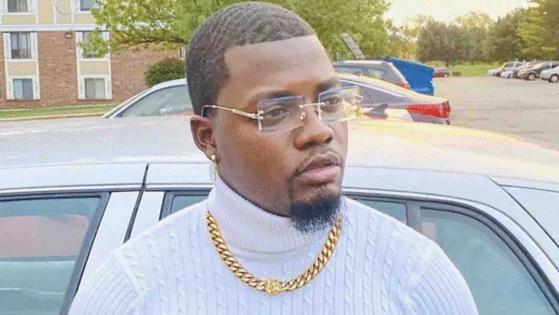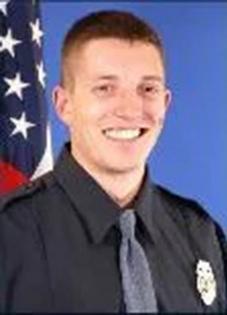After mistrial in Michigan police shooting case, Kent County prosecutor to decide on retrial. Experts weigh the difficulty
Published in News & Features
GRAND RAPIDS, Mich. — Kent County's top prosecutor said he'll decide in the coming weeks whether to retry a former Grand Rapids police officer for second-degree murder after a mistrial was declared Thursday, but experts say it could be a challenging road ahead given the case's media attention and other factors.
Christopher Schurr, 34, was on trial in Kent County Circuit Court for the fatal shooting of Patrick Lyoya, 26, after a traffic stop in 2022. A jury deliberated for three and a half days but couldn't decide on a verdict before Judge Christina Mims declared a mistrial Thursday morning.
Prosecutor Chris Becker said he was disappointed by the trial's outcome but not surprised given the outcome of similar cases.
"This happens," Becker told reporters Thursday. "This happens quite a bit in general cases. But especially, if we look across the country, there's a number of police-involved incidents where it ends up in a hung jury."
After the mistrial, Becker said he told Lyoya's family, who've also filed a civil lawsuit against Schurr: "Give me some time."
Schurr, who faced up to life in prison if convicted of second-degree murder, and his attorneys maintained throughout the two-week trial that he shot Lyoya in self-defense and feared for his life after the two wrestled over Schurr's Taser. But prosecutors argued the former officer was not in imminent danger and the shooting was unjustified.
Outside the courthouse, protesters gathered throughout the trial, though not as many were there after the trial ended. Some carried "Black Lives Matter" signs and flags. Others waved flags in support of law enforcement. At a park in Grand Rapids on Thursday afternoon, more than a dozen police officers were in place, likely in case tensions flared.
Matt Borgula, Schurr's defense attorney, said even with the mistrial, Schurr and his team couldn't declare victory "because there really is no winning here." He said Schurr never wanted to take a life and "that decision in that split second" was one of the most difficult with which he's had to deal.
"A man died, and that is a very serious thing," Borgula said. "Christopher Schurr is happy that the jury didn't determine that he's criminally responsible for that death. But it's hard to say that we feel like this is a victory."
Experts weigh in
Borgula and Becker spoke to jurors after the mistrial was declared. Borgula said the jury was "overwhelmingly" in favor of acquittal, with some holdouts. Along with the second-degree murder charge, Mims, the judge, said the jury also could consider a voluntary manslaughter charge, which carries a penalty of up to 15 years in prison, a $7,500 fine or both.
Scott Weinberg, a defense attorney at Bloomfield Hills-based law firm Hertz Schram and a former Macomb County prosecutor, said it's common for prosecutors and defense attorneys to interview a deadlocked jury after a mistrial is declared, as they did in this case. Becker declined to say what he learned from the jury.
“It’s questionable whether or not he’s going to retry the case,” Weinberg said. “Sometimes prosecutors, when they have difficult cases like that and they really are not sure of the outcome on the second trial, they may offer something beneficial for both sides.”
If Becker decides to retry the case, the heavy media attention on it may impact the jury selection and make it more difficult to find an impartial jury who doesn’t know about the case, Weinberg said.
“You will have a more informed community, and that can make it difficult to pick a new jury,” Weinberg said.
Having the defense know how the jury receives the prosecution’s evidence can also impact prosecutors in a second trial, he said.
“It’s about does he feel he has a better shot to win the second case and get a conviction, either for principal charge or less offense,” Weinberg said.
State Rep. Phil Skaggs, D-East Grand Rapids, called on Becker to begin the retrial process as soon as possible, arguing a mistrial “leaves critical questions unresolved and emotions raw.” He urged “everyone to respond to this moment with peace, compassion and strength.”
“Let us honor Patrick Lyoya’s memory by continuing to push for justice and the systemic reforms needed to prevent tragedies like this from ever happening again,” Skaggs said in a statement.
Mistrials not common
Mistrials are not common, Weinberg said, as trials themselves are not common. An average of 2.3% of Michigan criminal cases ended with a jury verdict in the past 10 years, according to state court data. The state does not track how often a case ends in a mistrial, said Michigan Supreme Court spokesperson John Nevin.
Royal Oak-based defense attorney Jerome Sabbota, who is a former prosecutor, said Becker is going to have a difficult time convicting Schurr.
“People who favor law enforcement, they’re not going to convict a cop who does that (chases and shoots a suspect),” Sabbota said. “I think as a prosecutor, you have to be really sure there’s no way this cop reasonably believed he was not going to get hurt. It’s a very difficult thing to do because it’s in his mind.”
Data on police crimes
Schurr's mistrial came one day after three Memphis police officers were acquitted for the fatal beating of another Black motorist, Tyre Nichols.
Between 2005 and 2025, there were 205 non-federal police officers charged in the U.S. with murder or manslaughter after an on-duty shooting, according to data provided by Philip Matthew Stinson, a criminal justice professor at Bowling Green State University and the lead researcher of the Henry A. Wallace Police Crime Database, which tracks data on police crimes.
Of those 205 cases, 165 of the cases have concluded with only 69, or 42%, resulting in a conviction — 28 by guilty plea, 40 by jury trial and one by bench trial.
The remaining 96 cases ended in a non-conviction: 44 were acquitted at a jury trial, nine were acquitted at a bench trial, 15 were dismissed by a judge, 24 were dismissed by a prosecutor, one received a deferred adjudication and three had instances where a grand jury refused to indict.
In the cases where an officer has been convicted, it is often for a lesser offense. Of the 69 officers convicted of a crime over the past 20 years, 14 (20%) were convicted of charges that didn’t include murder, manslaughter or any form of homicide.
During the trial, which included multiple experts who testified about the use of force and when it's justified, Schurr testified that he feared for his life when Lyoya had his Taser.
When he decided to grab his pistol and shoot Lyoya, Schurr said he felt he had no other choice and that it was a “split-second” decision.
“If I had waited for him to point (the Taser) at me, it would be too late. I thought I was gonna die,” Schurr said.
_____
©2025 www.detroitnews.com. Visit at detroitnews.com. Distributed by Tribune Content Agency, LLC.










Comments